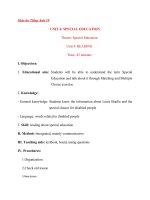Giáo án Tiếng Anh 10 Unit 4: Special education
Bạn đang xem bản rút gọn của tài liệu. Xem và tải ngay bản đầy đủ của tài liệu tại đây (308.99 KB, 11 trang )
Giáo án English 10
Part A: READING (TCT-20)
• Aims
To give students more knowledge of special education through reading.
• Objectives
- To help students to get meanings of new words in context and be accustomed
of extensive and intensive reading.
• Methods and materials
Integrated, mainly communicative skills. Textbook.
• Procedures
Time
Teacher’s activities - Content
5’
Sts’ activities - possible answer
Warm up
T lets sts look at the Braille Sts answer the questions.
Alphabets and answer questions
about it.
- What is it? What’s it used for?
- Where is it often used?
10’
Presentation
T supplies some words sts may need
to understand the passage.
- be different from: (explanation)
- disabled (situation, explanation)
- deaf (adj) (explanation, translation)
dumb
translation)
(adj)
(explanation,
Giáo án English 10
- mentally retarded ()
- opposition (translation)
- effort (n) (make...)
- time-consuming (adj)
- demonstrate (v) (translation)
- demonstration (n) (translation)
Practice
5’
5’
T asks sts to read the passage in
silence and do the task.
* Task 1: Matching
T asks sts to match new words/
phrases with their meanings.
* Task 2:
10’
Sts do the task.
1. c
3. a
2. e
4. b
5. d
Multiple choice
T asks sts to read the whole passage
to decide on the multiple choices.
1. D
4. C
2. B
5. D
3. A
10’
After reading
T asks sts to make a summary of the
passage by filling in blanks with
words they can seek in the passage.
1. disabled
2. read
3. write
4. efforts
5. opposition
6.
timeconsuming
7. maths
8. arms
9. fingers
Giáo án English 10
10. proud
Consolidation
T goes over the words and ideas
from the passage.
Part B: SPEAKING (TCT-21)
• Aims
To help students know what is needed in making an interview.
• Objectives
- To give students practice in asking and answering questions often used in an
interview and reporting one.
• Methods and materials
Integrated, mainly communicative skills. Textbook.
• Procedures
Time
Teacher’s activities - Stages
5’
Sts’ activities - possible answer
Warm up
T asks sts to answer questions:
Sts answer questions.
- What’s an interview?
(answers may vary)
- Have you ever been an interviewer/
interviewee?
Presentation
7’
* Task 1: Filling in the blanks.
T introduces questions used in an
Sts read the questions carefully and
do the task.
Giáo án English 10
interview in task 1 and asks sts to fill
in the blanks in the interview with
suitable questions.
A. 4
D. 6
B. 1
E.3
C. 2
F. 5
G. 7
Practice
10’
* Task 2: Making interviews.
T asks sts to make ones by asking Sts do the task in pairs.
and answering questions in task 1.
13’
* Task 3:
Reporting interviews.
Sts prepare for public check.
T asks sts to tell the whole class
what they know about their partners.
10’
Consolidation
T asks 2 students to make an
interview with public check.
Part C: LISTENING (TCT-22)
• Aims
To give students practice in listening about handicapped people
• Objectives
- To help students to listen for specific information through True - False and for
missing words.
• Methods and materials
Integrated, mainly communicative skills. Textbook.
Giáo án English 10
• Procedures
Time
Teacher’s activities - Stages
3’
Sts’ activities - possible answer
Warm up
T asks sts to list sth the disable can Sts list some action
do well.
T then introduces to them
photography - as an action the
disabled can do easily.
7’
Presentation
Before you listen
T gives some explanations of the Sts write down the words and fill in
words and asks sts to fill in blanks the blanks.
with those words.
- photograph (n) (real object)
- photography (n)
- photographic (adj)
- photographer (n)
- photogenic (adj) (translation)
(explanation)
T lets sts listen to and repeat the
Sts listen and repeat.
words that appear in the passage.
Practice
15’
* Task 1: True or False
Sts read and do the task.
T lets sts read the statements 1. T
carefully and then listen to the tape.
Giáo án English 10
2. F (not mentioned)
3. T
4. F (the beauty of daily life)
* Task 2: Gap filling
15’
5’
5. T
T asks sts listen to the part in the Sts listen and do the task.
textbook and fill in blanks with
1. photographic 6. simple
words.
2. 19
7. peaceful
3. exhibition
8. chickens
4. 50
9. stimulated
5. beauty
10. escape
Consolidation
After you listen
T asks sts to retell the story about
the VTK photography club.
Part D: WRITING (TCT-23)
• Aims
To help students have more practice in writing letters.
• Objectives
- To make students use the knowledge of writing other kinds of letter in writing
a letter of complaint.
• Methods and materials
Giáo án English 10
Integrated, mainly communicative skills. Textbook.
• Procedures
Time
Teacher’s activities - Stages
5’
Sts’ activities - possible answer
Warm up
T points at the brochure and asks Sts answer the questions. (answer
students some questions.
may vary)
- What is it?
- What does it say?
- How is the information?
- Do you think the information in it
is true?
Presentation
T asks sts to write something often
written in a letter of complaint.
10’
10’
* Task 1: Completing a dialogue.
Sts do the task in pairs.
T asks sts to work in pairs filling the
1. I’m not happy with it.
blanks with facts concerning
information in the advertisement.
2. Not all the teachers / all of them
are native.
T gives some explanations that help
sts write complaint.
3. That’s not true ...
Some
half
all
My class has ...
of
N with determine
4. I don’t. I have to pay them.
Object, Pronoun
5. Not all the rooms are airconditioned. My room is not.
none
-native (adj) a native teacher
6. Classes often start late and finish
early.
Giáo án English 10
the teacher ...
-pay for sth:
-air-conditioned (adj)
The room is air-conditioned.
The air-conditioned room.
20’
Practice
T lets sts practice writing a letter of
complaint.
* Task 2:
Completing a letter with complaints.
Sts write letters individually then
T asks sts to look at the form of the read out for public check.
letter and fill in the letter with
(sts’ letter may be marked with
complaints concerning the points
grammar and spelling criteria)
mentioned in task 1.
Consolidation
T reminds sts of the form of a
normal letter and that of a letter of
complaint.
Giáo án English 10
Part E: LANGUAGE FOCUS (TCT-24)
• Aims
To give students some more knowledge of grammar points related to the unit as
well some pronunciation practice.
• Objectives
Some particular points:
- Pronunciation: /4/ and /0:/
- Grammar: the + adj; used to + Inf: which as a connector
• Methods and materials
Integrated, mainly communicative skills. Textbook.
• Procedures
Time
Teacher’s activities - Stages
3’
Sts’ activities - possible answer
Warm up
T asks sts to distinguish the 2 words: Sts distinguish the 2 words.
On top of the statue, there was a
torch
Pronunciation
3’
Presentation /4/ and /0:/
T helps sts distinguish the /4/ and / Sts pronounce the words.
0:/ in ‘top’ and ‘torch’ and lets them
repeat the example.
Practice
7’
T lets sts listen and repeat the
sentences after the tape.
Sts repeat the sentences.
Grammar
Giáo án English 10
10’
Presentation
T gives some explanation of the 3 Sts give more examples.
point.
- The + adj = collective noun
The + adj (+ Vpl)
- Used to + Inf
past habit
Sts give examples using “used to
Inf” for past habits.
(-) didn’t use to
(?) Did S use to
(*) be/ get used to V-ing
Sts remember the differences.
- which - Relative pronoun
- Connector
Practice
7’
EX 1: The + adj
EX 1: Sts do the task.
T asks sts to use the + an adj to fill 2. the injured
in the blanks.
3. the unemployed
4. the sick
5. the rich - the poor
EX 2: Used to ...
7’
EX 2: Sts do the task.
T asks sts to fill in the blanks with
1. used to smoke (gave up)
‘used to’ and a proper verb.
2. used to have (sold it)
(T explains more why ‘used to Inf’
is used)
3. used to live (come to live in)
4. used to eat (rarely ... now)
Giáo án English 10
5. used to be (not .. any longer)
6. used to take (40’ an hour)
7. used to be (it closed ...)
EX 3: Which - connector
6’
2’
T asks sts to match A with B using
‘which’ to make a new sentence.
Consolidation
8. used to go
2. d
4. g
6. d
3. f
5. a
7. b









